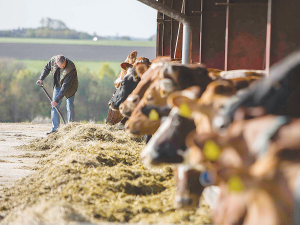DairyNZ chair wants cross-party deal
New DairyNZ chair Tracy Brown says bipartisan agreement among political parties on emissions pricing and freshwater regulations would greatly help farmers.
 Under the buy-out scheme, the Government will buy the businesses of Dutch livestock farmers who are categorised as ‘regular’ or ‘peak’ polluters.
Under the buy-out scheme, the Government will buy the businesses of Dutch livestock farmers who are categorised as ‘regular’ or ‘peak’ polluters.
While New Zealand seems to be treading water on the subject of pricing emissions and the future of He Waka Eke Noa (HWEN), pending a new government, the Netherlands has been clearer on its proposed farm buy-out scheme, as part of its effort to reduce nitrogen emissions by at least 55% by 2030.
However, negotiations to reach an overall agreement on the future of the Dutch agricultural sector broke down in mid-2023. The government spearheading the process has since dissolved, so while the voluntary buy-out scheme is now available for farmers, it will be up to a future government to devise new, additional measures should this not be enough to meet reduction targets.
Under the buy-out scheme, the government will buy the businesses of Dutch livestock farmers who are categorised as 'regular' or 'peak' polluters.
The purchase price will be between 100 to 120% of the value of their business, with the farmer still able to retain the land. In return, those farmers must permanently reduce nitrogen emissions on the land by up to 85% and are not permitted to continue the farming business in the Netherlands or elsewhere within the European Union.
Looking at the scheme in more detail, following approval from the European Commission, the plan is to buy out livestock farms near protected nature areas, targeting two categories for farmers volunteering to be bought out. "Peak polluters" are set to receive 120% of the value of their business' while "regular polluters" will receive 100% of the value of their business.
There is a technical calculation to determine what category a farm falls into that includes total nitrogen leakage as well as proximity to protected nature areas. There is no published list as such, although it is understood that there are about 3,000 farms in the 'peak polluter' category and approxmately 8,000 farms in the 'regular polluter' classification.
In parallel to the farm buy out scheme, the government was also negotiating an Agricultural Agreement with the farming sector on its future in the Netherlands. A key sticking point concerned a proposed regulation to increase extensification of farming operations, in particular, the limit on the number of livestock per hectare.
Extensification refers to the process in which the same number of livestock is spread over a larger area of land, reducing the pressure on the farmland.
That pressure is driven by the amount of fertiliser used on the land, that in turn might leach into nearby rivers and creeks and have adverse effects.
When launched in June 2023, Dutch Minister for Nature and Nitrogen Christianne van de Wal warned farmers that "there will be no better offer hereafter".
One of New Zealand’s longest-running pasture growth monitoring projects will continue, even as its long-time champion steps away after more than five decades of involvement.
The Insurance & Financial Services Ombudsmen Scheme (IFSO Scheme) is advising consumers to prepare for delays as insurers respond to a high volume of claims following this week's severe weather.
Additional reductions to costs for forest owners in the Emissions Trading Scheme Registry (ETS) have been announced by the Government.
Animal welfare is of paramount importance to New Zealand's dairy industry, with consumers increasingly interested in how food is produced, not just the quality of the final product.
Agriculture and Forestry Minister Todd McClay is encouraging farmers and growers to stay up to date with weather warnings and seek support should they need it.
The closure of SH2 Waioweka Gorge could result in significant delays and additional costs for freight customers around the Upper North Island, says Transporting New Zealand.
OPINION: There will be no cows at Europe's largest agricultural show in Paris this year for the first time ever…
OPINION: Canterbury grows most of the country's wheat, barley and oat crops. But persistently low wheat prices, coupled with a…